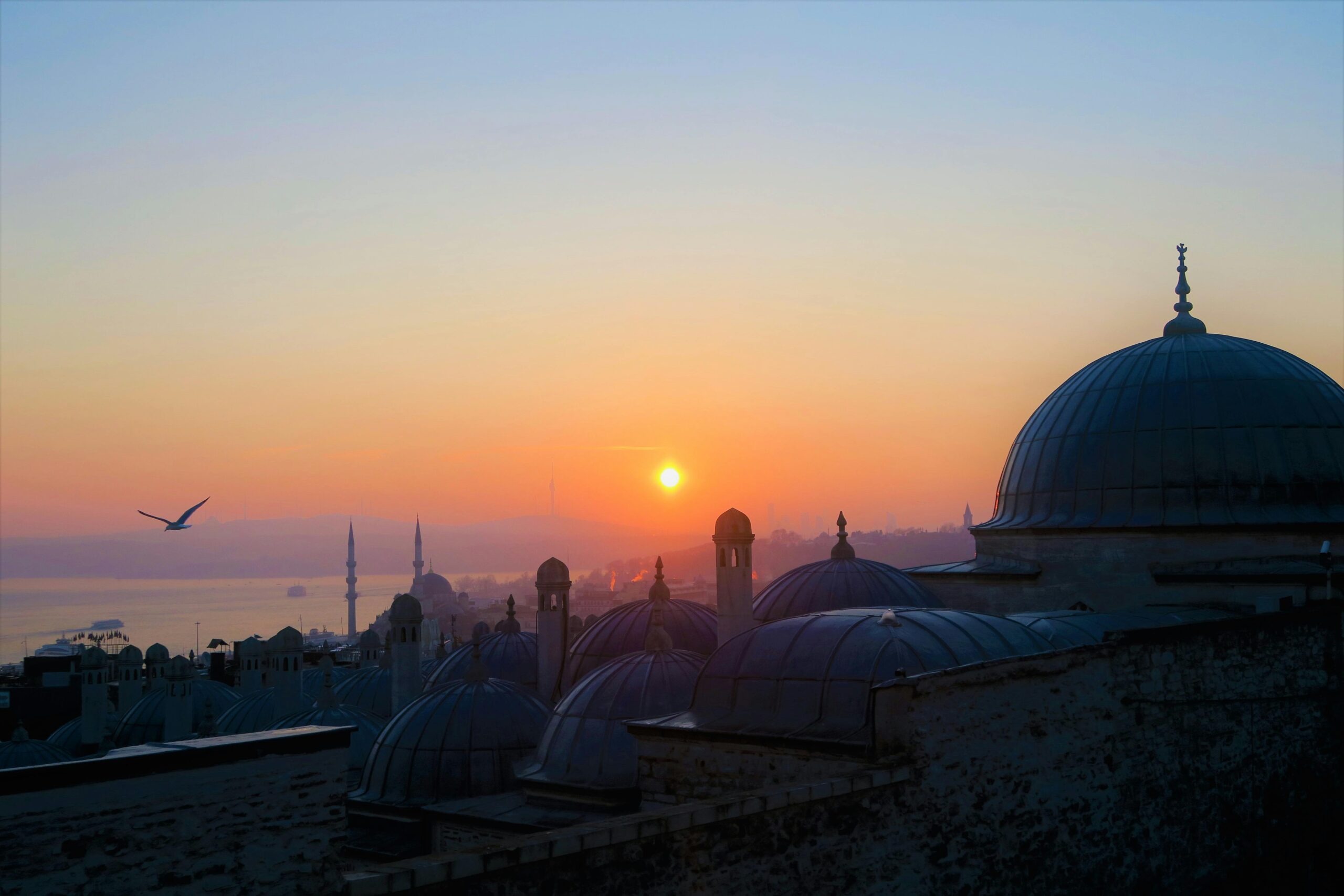
04.22.25
Stories of Tawakkul – Prophet Ibrahim (AS) and his deep faith
Prophet Ibrahim (AS), known by many as the father of the Prophets, is an example of unwavering Tawakkul (trust in Allah).
His life is filled with instances where he relied completely on Allah, even when faced with the most challenging trials.
Here, we explore key moments in his life where his complete trust in Allah shone through, serving as an inspiration for believers today.
Prophet Ibrahim and his journey to Islam
As a child in the kingdom of Babylon, Ibrahim (AS) noticed that idols were worshipped as though they were gods, with his own father Aazer crafting idols from stone or wood.
Growing up, Ibrahim (AS) believed that the idols which his people worshipped were false, and questioned how these lifeless statues, which were incapable of seeing, hearing or helping themselves, could be deities.
Determined to find the truth, Ibrahim (AS) reflected on the world around him. One night, he climbed a mountain and observed the sky.
This instance was outlined in the Qur’an:
“We also showed Abraham the wonders of the heavens and the earth, so he would be sure in faith. When the night grew dark upon him, he saw a star and said, “This is my Lord!” But when it set, he said, “I do not love things that set.” Then when he saw the moon rising, he said, “This one is my Lord!” But when it disappeared, he said, “If my Lord does not guide me, I will certainly be one of the misguided people.” Then when he saw the sun shining, he said, “This must be my Lord—it is the greatest!” But again when it set, he declared, “O my people! I totally reject whatever you associate ˹with Allah in worship˺.”
Qur’an | Surah Al-An’am | 6:75-78
At that moment, he proclaimed:
“Indeed, I have turned my face toward He who created the heavens and the earth, inclining toward truth, and I am not of those who associate others with Allah,”
Qur’an | Surah Al-An’am | 6:79
Prophet Ibrahim (AS) put his full trust in Allah, despite being alone in his belief.
In a society where idol worship was the norm, rejecting these false gods meant facing rejection, ridicule, and even danger. Yet, Ibrahim (AS) remained steadfast, knowing that Allah alone was his guide and protector.
This unwavering Tawakkul and trust in Allah’s plan became a defining trait of his life and mission.
The fire of Nimrod
Prophet Ibrahim (AS) sought to guide his people away from idol worship. During a festival, he entered their temple and destroyed all the idols except the largest.
The Qur’an outlines what happened when the people returned and saw their so-called gods in ruins:
“They asked, ‘Was it you who did this to our gods, O Ibraham?’ He replied ˹sarcastically˺, ‘No, this one the biggest of them did it! So ask them, if they can talk!’”
Qur’an | Surah Al-Anbiya | 21:62-63
The townspeople replied saying that Ibrahim (AS) knew the idols cannot talk, to which Ibrahim (AS) replied:
“…Do you then worship instead of Allah what can neither benefit nor harm you in any way, Shame on you and whatever you worship instead of Allah! Do you not have any sense?”
Qur’an | Surah Al-Anbiya | 21:66-67
Enraged, they called for Ibrahim (AS) to be burned alive. A massive fire was prepared, following commands by Nimrod, the King of Babylon.
Ibrahim (AS) was placed in a giant catapult to be thrown into the flames. At that moment, Angel Jibreel (AS) appeared and asked if he needed anything. Ibrahim (AS) replied that his only need was for Allah to be pleased with him.
Then Allah commanded:
“O fire! Be cool and safe for Ibraham.”
Qur’an | Surah Al-Anbiya | 21:69
The fire obeyed, only burning his chains and leaving him unharmed. Ibrahim (AS) walked out of the flames untouched, leaving the crowd in shock. Some realised the power of Allah, while others stubbornly refused to believe.
This event serves as a powerful example of Tawakkul. Despite facing death, Ibrahim (AS) remained unwavering, seeking only His pleasure.
This story reminds us that when we place our trust in Allah, He is sufficient for us.
The sacrifice of Ismail (AS)
One of Prophet Ibrahim (AS)’s greatest tests of Tawakkul was when Allah commanded him in a dream to sacrifice his beloved son, Ismail (AS).
As a father, this was an unimaginable test, yet Ibrahim (AS) did not waver. He trusted that Allah’s command was for a greater purpose.
When he told Ismail (AS) about the dream, his son displayed the same level of trust in Allah:
“Then when the boy reached the age to work with him, Abraham said, ‘O my dear son! I have seen in a dream that I ˹must˺ sacrifice you. So tell me what you think.’ He replied, ‘O my dear father! Do as you are commanded. Allah willing, you will find me steadfast.’”
Qur’an | Surah As-Saffat | 37:102
At the last moment before the sacrifice, Allah replaced Ismail (AS) with a ram, showing that Ibrahim’s (AS) unwavering trust and obedience had been accepted. This act of Tawakkul is commemorated each year by Muslims during Eid al-Adha.
Leaving Hajar and Ismail (AS) in the desert
Another powerful example of Tawakkul is when Allah commanded Ibrahim (AS) to leave his wife, Hajar, and Ismail (AS), in the barren desert of Makkah.
There was no food, water, or shelter – just dry and empty land.
Bewildered, Hajar asked Ibrahim (AS):
“Has Allah ordered you to do so?” He said, “Yes.” She said, “Then He will not neglect us.”
Hadith | Sahih al-Bukhari
As Ibrahim (AS) walked away, he made a heartfelt supplication:
“Our Lord! I have settled some of my offspring in a barren valley, near Your Sacred House, our Lord, so that they may establish prayer. So make the hearts of ˹believing˺ people incline towards them and provide them with fruits, so perhaps they will be thankful.”
Qur’an | Surah Ibrahim | 14:37
With complete trust in Allah, Hajar tirelessly ran between the hills of Safa and Marwa in search of water for her thirsty son.
By Allah’s mercy, she then heard a voice. She called out and saw Angel Jibreel where the well of Zamzam now stands. Angel Jibreel had dug through the sand and unearthed a well of water, providing them with sustenance and turning the barren land into a place of life.
Today, the act of walking between Safa and Marwa is part of the Hajj pilgrimage, a lasting reminder of Hajar’s unwavering faith.
A legacy of Tawakkul
Prophet Ibrahim (AS)’s life was a testament to pure Tawakkul – trusting in Allah even when faced with unimaginable hardship.
Whether standing firm against idol worship, preparing to sacrifice his son, or leaving his family in the desert, he remained steadfast, knowing that Allah’s wisdom surpasses human understanding.
His story teaches us that no matter how difficult our trials may seem, placing complete trust in Allah will always lead to guidance, provision, and ultimate success.





